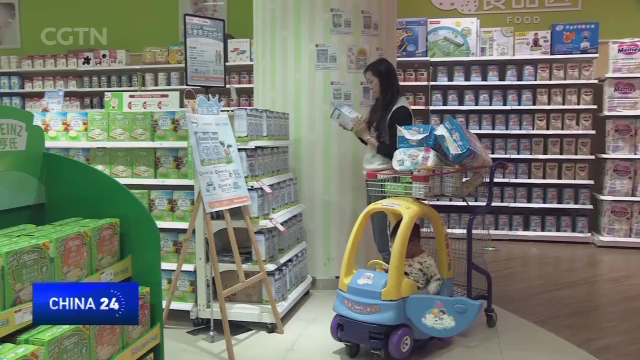
23:04, 11-Nov-2018
China Infant Formula: Chinese gov't committed to guaranteeing quality of domestic producers
Updated
22:53, 14-Nov-2018
02:56

Meticulously checking the ingredients.
Liu Wenjing is trying to choose the best infant milk formula for her son, who's just 12 months old.
But with little or no knowledge of the industry, she nevertheless has one strict requirement only imported brands.
LIU WENJING "Honestly, I don't know much about infant milk formula, but somehow I trust the imported brands more. I think they seem to be safer and better."
And she's not alone.
According to a survey by American firm, McKinsey & Co, more than half of the 10,000 parents surveyed said they also prefer a foreign brand for their baby formula.
ZHENG CHUNYING BEIJING "The mistrust of domestic brands stems from a huge food safety scandal in China where melamine-tainted milk and formula sickened tens of thousands of infants and while that was all of ten years ago, the crisis of confidence it sparked has shown little sign of relenting. So are they right to remain skeptical?"
I took that question to Professor Luo Yunbo, the director of the Special Food Research Center at China Agriculture University, he argued the country had learned its lesson from previous scandals.
LUO YUNBO DIRECTOR OF SPECIAL FOOD RESEARCH CENTER, CHINA AGRICULTURE UNIVERSITY "Chinese dairy products are now as safe as overseas products, or even safer. According to official data, 99.8 percent of them pass the official standard. That's very high."
And perhaps such a result is down to the country's intensified efforts to better regulate the sector.
For instance, the latest measures by the China's food safety watchdog requires producers to register their formulas before they can be sold on the Chinese market.
And besides the government's intervention, domestic producers have also been looking inward and working hard to guarantee the quality of their own products.
LI CUIZHI, DIRECTOR QUALITY INSPECTION CENTRE, YILI INDUSTRIAL GROUP "We've set a much higher safety regulation standard for self-inspection our satisfactory line is even higher than that of the country's, in order to set two safety nets to ensure our products are qualified."
The irony here is that many overseas brands, selling through various cross-border platforms, aren't even requested, never mind mandated, to go through the same red tape, which creates a new problem for parents.
HUO XIAOMEI, CHINA INT'L E-COMMERCE CENTER DAIRY CONSULTANT "Many small overseas brands that are not able to meet the country's official standards and requirements are still accessible to many Chinese consumers through various platforms. The quality of such products can barely be guaranteed, and the prices of such products are also hard to value raiding the entire industry in China."
Despite of the challenges ahead, Huo says she's optimistic about the future of Chinese brands in this highly competitive market.
She says they will ultimately come out on top because parents will soon realise their products are more suited to the constitutions of Chinese babies.
With China's strong determination to produce high-quality dairy products, perhaps one day Miss Liu can be convinced to buy Chinese domestic brands for her little boy.
ZHENG CHUNYING, CGTN, BEIJING.

SITEMAP
Copyright © 2018 CGTN. Beijing ICP prepared NO.16065310-3
Copyright © 2018 CGTN. Beijing ICP prepared NO.16065310-3